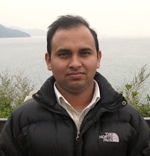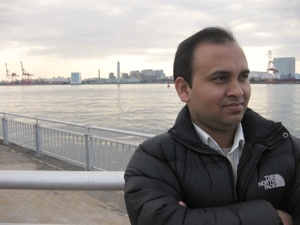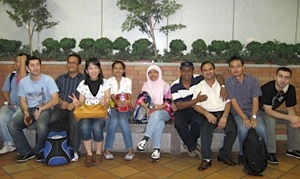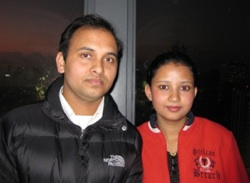 Krishna Bahadur Raut, Nepal
Krishna Bahadur Raut, Nepal
Joint Secretary, Ministry of Labour and Transport Management
& Executive Director of Social Security Fund
Public Policy Program (’09)
What is your area of specialization and how did you come to work in this area?
During my studies for the Master of Public Policy in GRIPS my main focus was on economics. When I returned from Japan after completing my MPP, I was posted in the Ministry of Physical Planning and Works. When two vacancies became available for the position of Joint Secretary I participated in the very competitive exam conducted by the Public Service Commission of Nepal. I was fortunate to pass the exam and the Government of Nepal has deputed me in the post of Executive Director of the Social Security Fund.
You have recently been promoted to Joint-Secretary at the National Planning Commission Secretariat. Congratulations! What are your main tasks and responsibilities?
I have been promoted to the Joint Secretary in the Administrative Service of the Civil Service of Nepal. Now, I am working at the Social Security Fund, which is under the Ministry of Labor and Transport Management. In this fund, I am member secretary of the Board of Trustees and Executive Director of the Social Security Fund’s Secretariat. My major tasks and responsibilities are:
 - to prepare and execute the long-term and annual plan of the fund,
- to prepare and execute the long-term and annual plan of the fund,
– to execute the decisions taken by the Board of Trustees of the Social Security Fund,
– to design and implement the social security schemes as envisaged by the regulation, (nine different schemes)
– to formulate and submit the Social Security Act to the concerned authority,
– to mobilize the fund,
– to administer, supervise and monitor the performance of the staff of the Fund’s secretariat, and so on.
In this capacity, what do you see as the main opportunities and challenges for Nepal over the course of the next five to ten years?
The contribution-based social security schemes are quite new for the country. In developed countries like Japan, such schemes have been already implemented successfully. However, for resource-poor countries like Nepal, it is quite challenging to establish a database of the contributors, design schemes and successfully implement them. However, there are a lot of avenues for learning from other countries that have already well-established schemes in place. If we make full use of all these learning opportunities, within the next five years I believe we can establish a solid foundation for the design and implementation of social security schemes. And within ten years, we aim to have lots of experiences gained, sufficient resources to fund the schemes, and a pool of experts to design and implement them.
What are some of the biggest challenges you face in your work and what have been the most interesting or rewarding aspects of your career thus far?
Since this is a very new area, one of the big challenges I am facing is a gap in knowledge and experience to design and implement social security schemes. With more exposures and learning opportunities in this area in the days to come I am hoping to be able to catch up. At the same time, I was quite lucky to be the youngest person ever to have been promoted to the position of Joint-Secretary in Nepal’s Civil Service. This, I regard as the most interesting and rewarding aspects of my career in Civil Service thus far.

What led you to GRIPS? What was the most important thing you got out of your studies here, and how has your experience at GRIPS prepared you for future endeavours?
Prior to coming to Japan, I was working in the National Planning Commission. Many of my senior colleagues had been trained at GRIPS. So, I applied to GRIPS and was happy to be accepted for the one-year Public Policy Program with an ADB-JSP Scholarship. Besides the academic knowledge and insights I gained at GRIPS, I learned many things like Japanese culture, life style, working culture and diligence and so on. GRIPS also taught me to be bold and dynamic in my future endeavors. Similarly, It also aroused my curiosity and interest to pursue a further research degree in the same field.
Did the, perhaps more lucrative, private sector ever hold any appeal for you? If you could choose another profession to be in, what would it be?
The Nepalese private sector is not much corporatized. It is family-based. So, they have not really been appealing to me thus far. If I could choose another profession, it would probably be a teaching and research profession.
What is your fondest memory of your time spent in Japan? And what do you miss about Japan?
I had a lot of remarkable and interesting moments with my many friends from many different countries at GRIPS. But I would like to mention one moment in particular, namely the trip to Nagoya and Kyoto. It was a fieldtrip organized by GRIPS and we visited many places, among them a textile dyeing factory where we were given an opportunity to try for ourselves. I made a handkerchief that I later found in my GRIPS mailbox. I still keep it as a precious memory. I am also missing the smiles of the GRIPS staffs, the helpful nature of the Japanese people and, of course, Sakura (cherry blossoms) and the flower-viewing Hanami Festivals.
What is your favorite thing to do when you are not working?
In my spare time, I like reading newspapers, books and journal articles, listening to music of my choice or go for a long holiday with my family.
How do you maintain a balance between your work and the rest of your life?
I try to get my work done within the normal working hours. In Nepal we still have a six-day working week and I usually spend about seven hours per day in the office, from Monday till Saturday. After that, I spend time with family and friends.

What advice would you give to current GRIPS students?
I would like to say to all our new friends to make the most of the numerable teaching and learning opportunities offered at GRIPS. If spent wisely, your time at GRIPS will be really beneficial and the knowledge and skills acquired very instrumental to the future success in your career.
Do you have any suggestions on how to further strengthen and utilize the GRIPS alumni network?
I wish GRIPS would offer alumni the opportunity to take refreshers training courses to review and update topics for those who have not been able to keep abreast of developments. Also, many of the GRIPS alumni would be interested in pursuing a Ph.D. degree and GRIPS should emphasize the opportunities for Ph.D. admissions among alumni.





